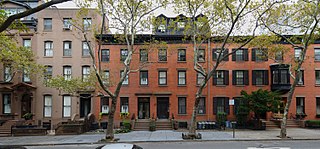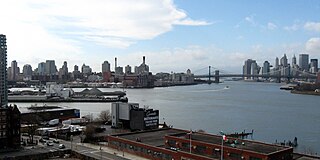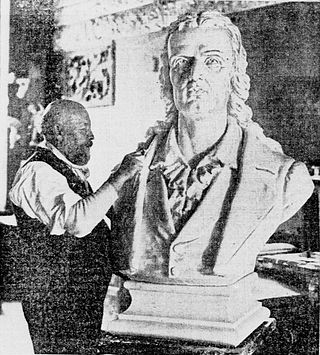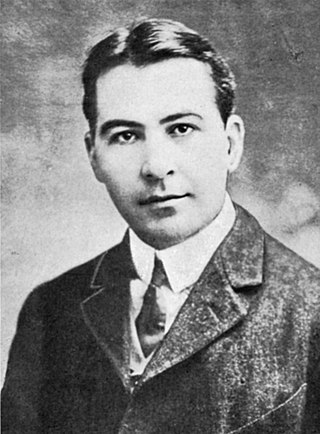Related Research Articles

Brooklyn is a borough of New York City located at the westernmost end of Long Island in the State of New York. Formerly an independent city, the borough is coextensive with Kings County, one of twelve original counties established under British rule in 1683 in the then Province of New York. As of the 2020 United States census, the population stood at 2,736,074, making it the most populous of the five boroughs of New York City, the most populous county in the State of New York, and the ninth most populous county in the United States. In 2022, the population density of Brooklyn was recorded at 37,339.9 inhabitants per square mile (14,417.0/km2), making it the second most densely populated county nationwide, behind only Manhattan. Had Brooklyn remained an independent city, it would today be the fourth most populous American city after New York, Los Angeles, and Chicago.

Daniel Chester French was an American sculptor in the late 19th and early 20th centuries. His works include the The Minute Man, an 1874 statue in Concord, Massachusetts, and his 1920 monumental statue of Abraham Lincoln at the Lincoln Memorial in Washington, D.C.

The Battle of Long Island, also known as the Battle of Brooklyn and the Battle of Brooklyn Heights, was an action of the American Revolutionary War fought on August 27, 1776, at and near the western edge of Long Island in present-day Brooklyn. The British defeated the Continental Army and gained access to the strategically important Port of New York, which they held for the rest of the war. It was the first major battle to take place after the United States declared its independence on July 4, 1776, in Philadelphia. It was the largest battle of the Revolutionary War in terms of both troop deployment and combat.

Fort Greene is a neighborhood in the northwestern part of the New York City borough of Brooklyn. The neighborhood is bounded by Flushing Avenue and the Brooklyn Navy Yard to the north, Flatbush Avenue Extension and Downtown Brooklyn to the west, Atlantic Avenue and Prospect Heights to the south, and Vanderbilt Avenue and Clinton Hill to the east. The Fort Greene Historic District is listed on the New York State Registry and on the National Register of Historic Places, and is a New York City designated historic district.

Fort Greene Park is a city-owned and -operated park in Fort Greene, Brooklyn. The 30.2-acre (12.2 ha) park was originally named after the fort formerly located there, Fort Putnam, itself was named for Rufus Putnam, George Washington's chief of engineers in the Revolutionary War.
Adolph Alexander Weinman was a German-born American sculptor and architectural sculptor.

Brooklyn Heights is a residential neighborhood within the New York City borough of Brooklyn. The neighborhood is bounded by Old Fulton Street near the Brooklyn Bridge on the north, Cadman Plaza West on the east, Atlantic Avenue on the south, and the Brooklyn–Queens Expressway or the East River on the west. Adjacent neighborhoods are Dumbo to the north, Downtown Brooklyn to the east, and Cobble Hill and Boerum Hill to the south.

Fort Lee Historic Park is located atop a bluff of the Hudson Palisades overlooking Burdett's Landing, known as Mount Constitution, in Fort Lee, New Jersey, United States. The park was conceived as early as 1952.

Wallabout Bay is a small body of water in Upper New York Bay along the northwest shore of the New York City borough of Brooklyn, between the present Williamsburg and Manhattan Bridges. It is located opposite Corlear's Hook in Manhattan, across the East River to the west. Wallabout Bay is now the site of the Brooklyn Navy Yard.

The Prison Ship Martyrs' Monument is a war memorial at Fort Greene Park, in the New York City borough of Brooklyn. It commemorates more than 11,500 American prisoners of war who died in captivity aboard sixteen British prison ships during the American Revolutionary War. The remains of a small fraction of those who died on the ships are interred in a crypt beneath its base. The sixteen ships included HMS Jersey, HMS Scorpion, Good Hope, Falmouth, Stromboli and Hunter.

Edmond Thomas Quinn was an American sculptor and painter. He is best known for his bronze statue of Edwin Booth as Hamlet, which stands at the center of Gramercy Park in New York City. His larger-than-lifesize bronze bust of Victor Herbert stands near The Pond in Central Park, New York City.

Fort Greene Historic District is a national historic district in Fort Greene, Brooklyn, New York, New York. It consists of 1,158 contributing buildings, two contributing sites, one contributing object, and two contributing structures. It is characterized by a concentration of architecturally distinguished three and four story townhouses developed speculatively and built between 1840 and 1890. Most are faced in sandstone and exhibit characteristics of the Greek Revival, Italianate, Second Empire, and Neo-Grec styles. It includes the 33-acre Fort Greene Park designed by Frederick Law Olmsted and Calvert Vaux in 1868. In the park is a column memorializing Revolutionary War soldiers that was designed by McKim, Mead, and White and erected in 1908. The park was built on the site of fortifications built in 1776 and 1814. Also located in the district is the Brooklyn Academy of Music.

Henry Baerer (1837–1908) was an American sculptor born in Kirchheim, Hesse, Germany.

Pietro Montana was a 20th-century Italian-American sculptor, painter and teacher, noted for his war memorials and religious works.

The bust of Edward Snowden, called Prison Ship Martyrs' Monument 2.0 by its creators, was an ephemeral, illegally installed public sculpture of Edward Snowden, an American whistleblower who leaked classified information from the National Security Agency (NSA) and was charged with federal crimes as a result. The bronze-like bust was placed in Fort Greene Park in Fort Greene, Brooklyn, New York City, on April 6, 2015. This sparked outrage by the Society of Old Brooklynites. It was attached to a Doric column on the perimeter of the park's Prison Ship Martyrs' Monument, a memorial and crypt which honors and inters the more than 11,500 American prisoners of war who died in the American Revolution while housed on British prison ships.

Thomas Walsh (1875–1928) was a poet, literary critic, translator, and scholar of Latin American and Spanish literature.

Edward Snowden in popular culture is part of the reactions to global surveillance disclosures made by Edward Snowden. His impact as a public figure has been felt in cinema, advertising, video games, literature, music, statuary, and social media.

The Concert Grove is a section of Prospect Park, Brooklyn, New York City, that historically functioned as an outdoor music venue. It still serves as a sculpture garden lined with busts of musical figures, largely put up by German American Sängerfest participants and other cultural groups. The Concert Grove also includes the Concert Grove Pavilion, formerly known as the Oriental Pavilion, and adjoins a Lincoln sculpture facing the lake.
Wilhelmena Rhodes Kelly was an African-American genealogist who traced her American lineage to the April 5, 1614, union of Pocahontas and John Rolfe. She was also a member of the Jamestowne Society. In 2019 she became the New York State Regent and a member of the National Board of Management, highest ranking woman of color in the National Society Daughters of the American Revolution (NSDAR), since its founding in 1890. She was a pioneer of African-American genealogy. Born and raised in Brooklyn, she was a local Brooklyn historian and member of the Society of Old Brooklynites (SOB), one of the borough's oldest civic organizations. She was the author of books on Bedford-Stuyvesant as well as the Crown Heights and Weeksville sections of Brooklyn, and family genealogy books tracing her family's American roots.
Eliza M. Chandler White was an American social reformer and charity work leader, as well as an abolitionist, and clubwoman. She founded the Brooklyn Home for Consumptives, and the Fort Greene Chapter of the Daughters of the American Revolution (D.A.R.). She was also the head of the Prison Ship Martyrs Committee which erected the Prison Ship Martyrs' Monument in Fort Greene Park, Brooklyn. She was one of the best-known women of Brooklyn in her day.
References
- 1 2 Ramirez, Jeanine (April 6, 2017). "Brooklyn as the Capital of Cool? The Society of Old Brooklynites Prefers the Good Old Days". NY1. Archived from the original on September 25, 2022. Retrieved February 16, 2023.
- 1 2 National Magazine: A Monthly Journal of American History. Vol. 19. 1893. p. 420.
- ↑ Abruzzo, Shavana (July 3, 2010). "Soc. of Old Brooklynites inducts new slate". New York Post. Archived from the original on February 16, 2023. Retrieved February 16, 2023.
- ↑ Perlman, Matthew (April 11, 2014). "Old Brooklyn defined: 25-year residency required for entry to this club". Brooklyn Paper. Archived from the original on February 16, 2023. Retrieved February 16, 2023.
- ↑ Martin, Douglas (September 23, 1995). "Resurrecting Patriots, and Their Park; Shrine to Revolution's Martyrs Is Part of Fort Greene Renewal". The New York Times. ISSN 0362-4331. Archived from the original on February 16, 2023. Retrieved February 16, 2023.
- ↑ Abruzzese, Rob (August 24, 2015). "Society of Old Brooklynites continues tradition of honoring the Battle of Brooklyn". Brooklyn Daily Eagle. Archived from the original on February 16, 2023. Retrieved February 16, 2023.
- ↑ Goldstein, Sasha (April 6, 2015). "Illegal Edward Snowden bust placed atop Brooklyn war monument in Fort Greene Park". New York Daily News. Archived from the original on February 16, 2023. Retrieved February 16, 2023.
- ↑ Katz, Andy (June 26, 2019). "Society of Old Brooklynites celebrates 139th anniversary". The Brooklyn Home Reporter. Archived from the original on January 28, 2023. Retrieved February 16, 2023.